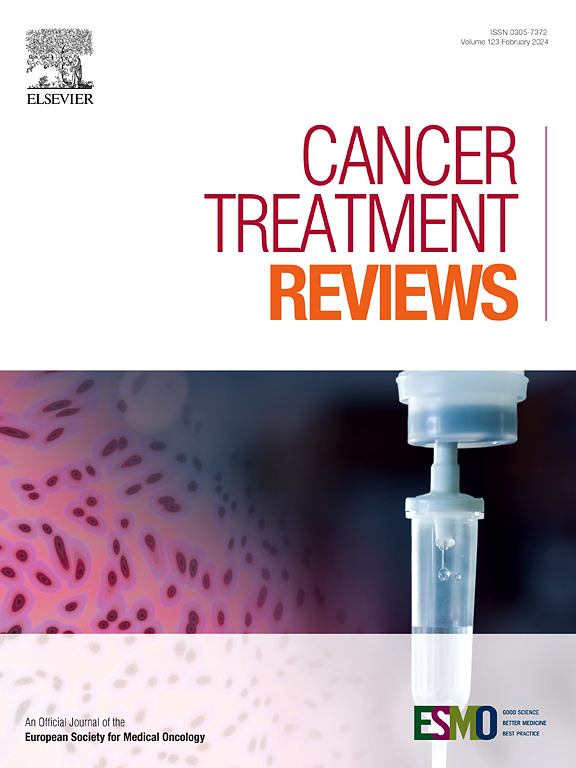Identification of the PROMs used to assess ICI toxicities and HRQoL in patients receiving immune checkpoint inhibitor treatment in cancer care and their suitability: A systematic review
IF 9.6
1区 医学
Q1 ONCOLOGY
引用次数: 0
Abstract
Background
The implementation of patient-reported outcome measures (PROMs) in the clinical identification of immunotherapy toxicities is a complex intervention. There has been very little work evaluating the clinical utility and generalisability of PROMs used after immune checkpoint inhibitor (ICI) treatment to date. We reviewed evidence on the use of PROMs assessing toxicities and health-related quality of life in patients treated with ICIs.
Methods
PubMed, EMBASE, MEDLINE, PsycInfo, CINAHL, Web of Knowledge, the Cochrane Library were searched (January 2008 – October 2024). Quantitative studies reporting the use of PROMs to identify, assess and manage toxicities at any timepoint and HRQoL associated with ICI treatment in adult patients with cancer were included. A narrative synthesis describes the key characteristics of the PROMs identified.
Results
43 studies were included; 12 on melanoma/skin, 12 on lung and 19 on other cancers. Study designs included 20 randomised controlled trials, 14 cohort studies, six cross-sectional studies and three non-randomised interventional trials. The lack of ICI-specific PROMs was highlighted, particularly as the PROMs used lacked sufficient sensitivity for ICI treatments.
Conclusions
There is need for an ICI-specific PROM for effective assessment of toxicities and a tailored PROM for assessment of HRQoL. Some suggested key domains by certain studies for ICI-specific PROMs include: (a) ICI-specific items (e.g. certain USD-I and PRO-CTCAE items) to capture symptoms associated with ICI treatments such as rash, myalgia, (b) role, psychological, emotional and social functioning domains within HRQoL assessments and (c) additional patient-reported toxicities not included in existing PROMs. Findings emphasize the importance of using a disease-specific PROM that is applicable, acceptable and sufficiently sensitive to identify toxicities and HRQoL issues across all stages.
确定用于评估接受免疫检查点抑制剂治疗的癌症患者 ICI 毒性和 HRQoL 的 PROMs 及其适用性:系统综述
在免疫治疗毒性的临床鉴定中实施患者报告的结果测量(PROMs)是一项复杂的干预措施。迄今为止,很少有研究评估免疫检查点抑制剂(ICI)治疗后使用PROMs的临床效用和普遍性。我们回顾了使用PROMs评估ici治疗患者的毒性和健康相关生活质量的证据。方法检索spubmed, EMBASE, MEDLINE, PsycInfo, CINAHL, Web of Knowledge, Cochrane Library(2008年1月- 2024年10月)。定量研究报告了在任何时间点使用PROMs来识别、评估和管理毒性,以及与成年癌症患者ICI治疗相关的HRQoL。叙述性综合描述了所确定的prom的关键特征。结果共纳入43项研究;黑色素瘤/皮肤12例,肺癌12例,其他癌症19例。研究设计包括20项随机对照试验、14项队列研究、6项横断面研究和3项非随机干预性试验。缺乏ICI特异性的PROMs被强调,特别是使用的PROMs对ICI治疗缺乏足够的敏感性。结论为有效评估ci毒性,需要一种针对ci特异性的PROM,需要一种针对ci特异性的PROM来评估HRQoL。某些研究为ICI特异性PROMs提出的一些关键领域包括:(a) ICI特异性项目(例如某些USD-I和PRO-CTCAE项目),以捕捉与ICI治疗相关的症状,如皮疹、肌痛;(b) HRQoL评估中的角色、心理、情感和社会功能领域;(c)现有PROMs中未包括的其他患者报告的毒性。研究结果强调了使用适用、可接受且足够敏感的疾病特异性PROM来识别所有阶段的毒性和HRQoL问题的重要性。
本文章由计算机程序翻译,如有差异,请以英文原文为准。
求助全文
约1分钟内获得全文
求助全文
来源期刊

Cancer treatment reviews
医学-肿瘤学
CiteScore
21.40
自引率
0.80%
发文量
109
审稿时长
13 days
期刊介绍:
Cancer Treatment Reviews
Journal Overview:
International journal focused on developments in cancer treatment research
Publishes state-of-the-art, authoritative reviews to keep clinicians and researchers informed
Regular Sections in Each Issue:
Comments on Controversy
Tumor Reviews
Anti-tumor Treatments
New Drugs
Complications of Treatment
General and Supportive Care
Laboratory/Clinic Interface
Submission and Editorial System:
Online submission and editorial system for Cancer Treatment Reviews
 求助内容:
求助内容: 应助结果提醒方式:
应助结果提醒方式:


